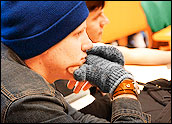
U.S. college students are falling behind their counterparts in other parts of the world in terms of their ability to calculate basic quantitative problems, such as automobile fuel consumption or the total cost of ordering office supplies, according to a new survey from the American Institutes for Research (AIR).
The study, funded by The Pew Charitable Trusts, indicated that 20 percent of four-year degree candidates and 30 percent of two-year degree candidates have “only basic quantitative literacy skills.”
Although other nations are putting pressure on the U.S. and its emerging work force, it is clear that American institutions of higher learning are still among the most attractive to foreign investors and interests due to their leadership in research and development.
Keeping Up
Today’s college students are not actually slipping below the quantitative literacy levels of previous graduates in the U.S.
In fact, students in the study — a sample of 1,827 graduating students from 80 randomly selected two-year and four-year public and private colleges and universities in the U.S. — scored better than their predecessors in “prose and document literacy,” and the difference between current and former college graduates in “quantitative literacy” scores was not significant.
However, the marketplace they are entering is much more competitive, the AIR survey noted, and in that light, “the surprisingly weak quantitative literacy ability of many college graduates is troubling,” said study director Stephane Baldi. “A knowledgeable workforce is vital to cope with the increasing demands of the global marketplace.”
A Broader Net
Other nations, particularly in Asia, often lead in math and science skills because their education focuses squarely on those subjects, Gartner research vice president Martin Reynolds told TechNewsWorld.
However, he opined, there is value to the more rounded education American students generally receive, which could contribute to the fact that the U.S. has more entrepreneurs with the range of skills required for success.
“In terms of higher education in the U.S., it’s different. It casts a much broader net than other countries,” he said.
Adding Up Pieces
While other nations may benefit from more rigorous basic education and a larger pool of potential achievers, few rival the U.S. in terms of the research and innovation taking place at American colleges and universities, Reynolds stressed.
“There’s a whole bunch of pieces to this,” he said.
A strong economy is also helping the U.S. remain competitive, but the largest hurdle continues to be the education of students before they get to college, Reynolds added.
“It’s that basic education level that’s the biggest challenge,” he said.





















































